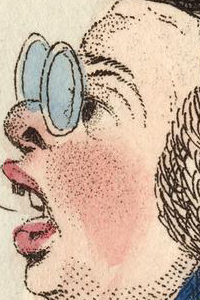George III

George III: (1738-1820) king of Great Britain (1760-1820) was born in 1738, first son of Frederick, Prince of Wales and Augusta. He married Charlotte of Mecklinburg-Strelitz in 1761, to whom he was devoted. The couple produced a prolific fifteen children: nine sons and six daughters. George was afflicted with porphyria, a maddening disease which disrupted his reign as early as 1765. Several attacks strained his grip on reality and debilitated him in the last years of his reign. Personal rule was given to his son George, the Prince Regent, in 1811. George III died blind, deaf and mad at Windsor Castle on January 29, 1820.
The Peace of Paris (1763) ended the Seven Years' War with France, with the strenuous, anti-French policies of the elder Pitt emphasizing naval superiority in the colonial warfare. Great Britain emerged from the conflict as the world's greatest colonial power. England thrived under peacetime conditions, but George's commitment to taxing the American colonies to pay for military protection led to hostilities in 1775. The colonists proclaimed independence in 1776, but George continued the war until the final American victory at Yorktown in 1781. The Peace of Versailles, signed in 1783, ensured British acknowledgment of the United States of America. The defeat cost George dearly: his sanity was stretched to the breaking point and his political power decreased when William Pitt the Younger became Prime Minister in 1783. George reclaimed some of his power, driving Pitt from office from 1801-04, but his condition worsened again and he ceased to rule in 1811.
